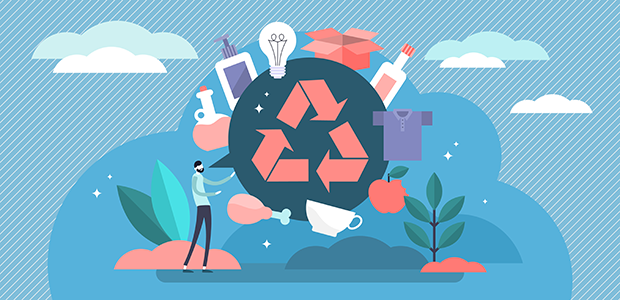
Cash for trash: how incentivisation will revolutionise recycling
As human beings, we primarily learn from trial and error. If our actions have positive outcomes, we feel compelled to repeat them; a behavioural pattern often driven by incentive and reward. Whether it’s buying one drink to get the second free, or donating old clothes to get money off the next order, incentives are key to understanding people and their priorities.
Unsurprisingly, recycling is no exception. For too long we’ve relied on the goodwill and inclination of individuals to recycle their waste, even though it often feels inconvenient and cumbersome. The system simply isn’t working. To shape human behaviour with long-term effect, we need to harness incentivisation to scale going green.
Our planet is hurtling towards climate catastrophe, and if we don’t swiftly move away from the ‘make, take, dispose’ model of the last century, and prioritise a more circular economy, it will ultimately be too late. So, it’s time that recycling got a rebrand.
In 1970, Gary Anderson, a 23 year-old American engineering student, won $2,500 in a design competition. His winning entry - a trio of green pointed arrows - would go on to become one of the most internationally recognised symbols of all time.
Since then, recycling has become a process that is widely recognised, but largely ineffective. A recent report found that only five percent of plastic waste is recycled in the US, with 85% of plastics ending up in landfill and the other 10% being burnt.
As a whole, the recycling system is confusing, inaccessible and - most detrimentally - overly reliant on the selflessness of individuals. There are too many stumbling blocks preventing people from effectively and consistently recycling, including confusing labels, contradicting instructions, insufficient facilities and the misconception that recycling has no impact.
Caring for the environment and sustainable living should be attainable to all, not only those with the luxury of time and resources to make greener decisions. Even against the backdrop of an ever-amplifying global conversation about the threat of plastic pollution and our planet’s trajectory towards climate disaster, the majority of countries haven’t been able to ingrain recycling as part of our routine behaviour. And so, it’s about time that we reworked the system.
Engaging people on an issue that feels beyond an individual’s control is no easy feat, especially when many feel that the big players in the climate crisis, such as oil and gas companies, fast fashion brands and airlines, aren’t playing their part. The swathes of alarming headlines that we encounter on a daily basis about the environment signal that information alone cannot drive sustainable behaviour.
The answer then? Motivation. In order to incorporate habitual changes that stand the test of time, individuals need to feel motivated, whether that’s personally, financially, socially or environmentally. Or - ideally - a combination of all four.
Amalgamating these four motivations is the logic behind Bower, the free-to-use recycling app that I founded to tackle waste. By scanning and depositing any waste product with a barcode in a verified recycling location, Bower users are rewarded with money, discounts or the option to make a charitable donation.
The idea behind Bower is simple: encourage people to recycle by giving them an immediate reward for doing so. And the behavioural science behind it is proven: people are willing to change their way if they are guaranteed personal benefits. We’ve created an app where recyclers are rewarded with a choice: would they prefer monetary compensation or ethical validation? As far as decisions go, this isn’t a bad one to have to make.
What’s more, our system is working. Bower has over 300,000 active users in the Nordic region, recycling more than 1.4 million packages every month. To date, the platform has helped save over 1,000 tonnes (one million kg) of CO2, the equivalent of 2.5 million car miles. By understanding what drives human behaviour, we’ve been able to reframe recycling in a way that increases engagement.
Recycling cannot be the only weapon in our arsenal for combatting the plastic crisis; in the long-term we need to reduce our production and consumption of the stuff.
However, in the short-term, recycling is one of the primary actions that individuals can take to reduce their plastic output, and it’s a pragmatic approach that can carry us closer to a circular economy. To wage an effective war on plastic pollution, we must get to the stage in which individuals reach for the recycling bin over general waste every single time. And this is only achievable through mass incentivisation, not through a reliance on each individual’s conscience.
Changing throwaway culture is an uphill battle, but it’s time we held ourselves accountable and made it universally known that making small changes really can make a sizeable difference.

